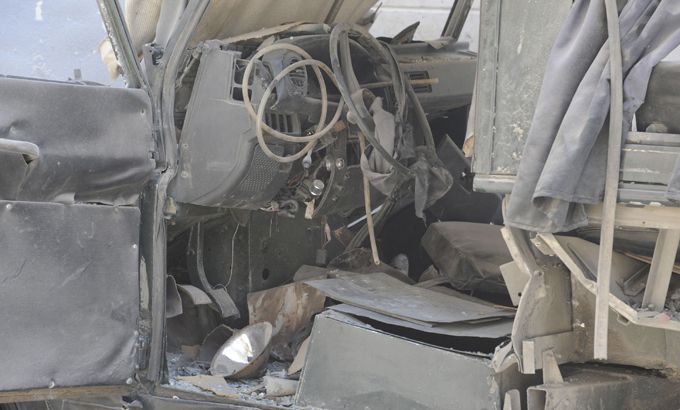Twin blasts near Damascus military compound
Attempt to strike at Syria’s military leadership comes six weeks after massive bomb killed four top security officials.

Syrian state television said six people were wounded in twin explosions in Damascus that appeared to target the country’s military leadership.
Damascus residents said on Sunday that the explosions occurred at a security building in the Abu Rummana district, not far from the compound housing the army and air force headquarters near the central Umayyad Square.
All of those injured were male conscripts, Syrian television said. Two of them were reported to be in a critical condition.
The opposition Syrian Local Coordination Committee reported scores of deaths in fighting in Damascus, its subrubs, and Hama on Sunday.-
Video footage from activists showed plumes of white smoke rising from the district, an upscale neighbourhood in the heart of Damascus that is home to several embassies.
“A terrorist attack with two bombs occurred in Al-Mehdi Street in the Abu Rummana district,” state television said.
The area contains several security service buildings, as well as the office of Vice-President Faruq al-Shara. The explosion occurred near a security services building which is tasked with protecting the army’s general staff.
In July, a bombing killed four members of President Bashar al-Assad’s top circle of security advisers, including his brother-in-law.
FSA responsible
The Ahfad al-Rasul [Grandchildren of the Prophet] brigade of the rebel Free Syrian Army claimed responsibility for the attack in a statement on Facebook, in which it also threatened to attack Assad’s palace.
“This operation was carried out in response to the massacres in Daraya,” said the statement, referring to the killing last week of at least 330 people in a town near Damascus. Regime and rebel forces blamed each other for the massacre.
Al Jazeera’s Sue Turton reported from Antakya, Turkey, that the attack on the heart of the military complex was a symbolically important one.
“If this has an impact on moral, a psychological impact on the Syrian forces, we may see a lot more people defecting,” she said.
“This group [the Grandchildren of the Prophet Brigade] isn’t that new, they are one of the many brigades trying to cause mayhem and havoc inside of Damascus,” she said.
Also on Sunday, state media reported that a car bomb explosion near a mosque at Sbeneh in the southern outskirts of the capital on Saturday killed 15 people. Sbeneh is a poor neighbourhood where anti-government sentiment is strong.
The latest explosions come after a car blast in the southeastern suburb of Jaramana on August 28 which killed at least 27 people, according to the Syrian Observatory for Human Rights.
The Britain-based activist group also said that more than 4,100 civilians were killed in the month of August alone. This brought the death toll up to an alarming amount of more than 26,000 people.
The UN Children’s Fund, UNICEF, says close to 1,600 people died last week. Activists blame the high number of civilian casualties on the Syrian military’s shelling campaign.
Change ‘unavoidable’
Lakhdar Brahimi, the UN-Arab League Special Representative for Syria, told Al Jazeera on Saturday that “change [in Syria] is necessary, indispensable, unavoidable”.
He backed away from calling for President Bashar al-Assad to leave office, and indicated that he would seek a negotiated outcome.
|
|
“It is too early to speak about who should go and who should stay. This is not a step backwards,” he told Al Jazeera.
“Mr Assad is there and is the president of the present government. Kofi talked to him, and I will talk to him.”
Brahimi had previously come out unequivocally against foreign intervention, arguing that this would escalate the conflict.
Meanwhile, Arab monarchies in the Gulf criticised the regime for deploying heavy weapons against civilians while ordering Iran not to interfere in their internal affairs.
The six members of the Gulf Co-operation Council at a meeting in Jeddah on Sunday also urged the international community to “assume their responsibilities and take measures to protect civilians” in Syria.
The GCC in a statement issued after the meeting in the Saudi western city condemned “the ongoing massacres which are due to the obstinacy of the regime in using heavy weapons, including planes and tanks” against civilians.
The monarchies ordered Iran to halt its “interference” in their internal affairs, citing an incident at the opening of the Non-Aligned Movement in Tehran when an official interpreter reportedly replaced the word “Syria” with “Bahrain” in a speech by Egyptian President Mohamed Morsi.
They asked their powerful neighbour to “cease these acts and not resort to or threaten to use force”.